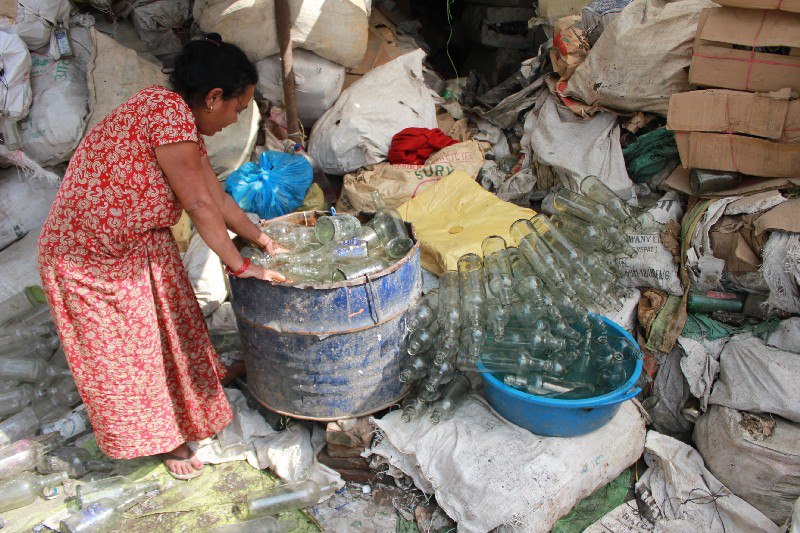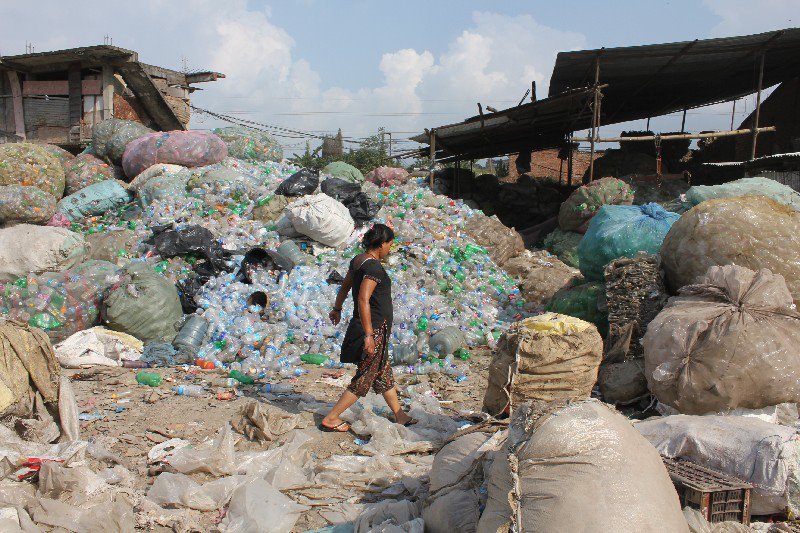Crouched alone near the entrance of a junkyard, Sharmila has spent most of the morning shoulder deep in a tub filled with caustic soda, glass, and murky grey water.
“I work here every day of the week, even Saturdays if I want,” she says. “I am my own boss. Freelance.”
Sharmila, a 42-year-old mother, first moved to Nepal’s capital city during the country’s civil war: a decade-long conflict that desolated the countryside before ending in 2006.
Like many rural Nepalese, she came to Kathmandu to find a job — any job.
Today, enclaved by a six metre wall of stacked white canvas bags, she spends her days washing used bottles to a bulk rate set by her junkyard’s kabidas (waste dealer).
If she cleans a carton of 180 soft-drink sized bottles, the bulk of the junkyard’s fare, then he pays her 33NR (AU$0.36).
Washing the rarer one litre containers — once replete with whiskey or Nepal’s potent millet homebrew, raksi – pays a bit more, at 6NR (AU$0.07) for just 12.
“It’s much easier to wash the big ones,” she says.
Most days she’ll make 125NR (AU$1.37), but occasionally washing bottles makes Nepal’s official daily minimum wage, 200NR (AU$2.20) — but “that’s pretty rare”.

As an informal waste worker, Sharmila is just one of the estimated 10,000 to 15,000 Nepalese who collect, sort, clean, and recycle other people’s rubbish daily.
Unlike in Australia, where local government is responsible for all waste management, there’s no structured policy in Kathmandu, with household waste collection privatised.
Households that can’t afford to pay for waste removal (half of Nepal lives on AU$1.25 a day) just dump rubbish in the streets or river, or burn it by the side of the road.
The result is a notoriously polluted city marked as much by crushed plastic, black smog, and the stench of rotting dog carcases, as it is by a Himalayan mountain view.
It's a largely undocumented state of affairs that’s led to a hierarchy born of necessity and poverty.
At the very bottom are pickers: mostly young males on the fringe of society branded as “scavengers” or khate.
Most pickers just roam the streets sorting through piles of rubbish, but a few choose to base themselves at one of the city’s various waste depots.
Mukesh Kumar, 24, has been coming to the city’s Lalitpur sanitation centre every day (except Saturdays) for five years.
“When I was a child, I would pick on the streets, but then too many other people started doing it and I couldn’t find anything to sell,” he says.
Mukesh says he makes between 200NR (AU$2.20) and 300NR (AU$3.29) a day from collecting bottles, glass, paper, and cellophane wrappers to sell by weight.
“I am very happy when I find something from the West,” he says, adding that plastic usually pays the best, at about 6NR (AU$0.07) a kilogram.
Like the majority of male pickers that come to Nepal for a different life, Mukesh is from neighbouring India.
While the two countries have an open employment pact, most pickers are not technically recognised by government authorities.
“The problem is that they’re not our own citizens,” says Pradeep Amatya, chief of the Environment and Sanitation Section of Lalitpur Sub-Metropolitan City.
“If they were Nepalese, we’d probably do more to improve their rights,” he says, adding that they’re treated like second class citizens or simply ignored.
Social vulnerability isn’t the only issue holding back stringent regulation. In a way, the whole system as it stands relies on informality.
For instance, says Amatya, traditional employment by depots would never work. Good picking needs the incentive of commission.
Several kilometres from Lalitpur, there’s a wasteland noted by the distinct cries of feriyas — men who ride bicycles through townships, calling out to buy people’s recycling.
Here, in this expansive community, is one of Kathmandu’s hundreds of junkyards. It’s here that a picker’s haul ends up.
Like the glass junkyard, this one specialises in a few specific materials — cardboard and plastic — and is staffed by about a dozen women between 15 and 60 years old.
Wading through the centre is a precarious business. It’s easy to end up waist high in water bottles, many of them originally chucked out by the valley’s bounty of tourists.
At the back of the junkyard is an industrial machine that crushes the plastic into large opaque cubes, to be sent to India.

Nepal’s booming neighbour is a top client for the city’s estimated 750 kabidas, who sell their best scrap to a few select wealthy Nepalese businessmen to export in bulk.
Everything that doesn’t end up exported will be fed back into Nepalese society, over and over again.
For instance, at the front of the plastic scrapyard, there’s a woman sewing ripped canvas bags together. These will soon make another journey back to the local produce markets.
A glass bottle will be collected from a food stall, washed by woman like Sharmila, and sold back to bottlers (albeit with a few more scratches each time).
Fabric sorters, usually based in small family-owned plots, also play a major role in society of breaking down discarded scraps of material into soft, grey mounds.
This material will end up stuffed inside pillows or cushions: the Nepalese literally sleep on mattresses stuffed with the old clothes of their fellow countrymen.
“Most people don’t recognise these centres,” says Janu Singh Dongol, a community development officer with PRISM, an agency trying to improve the lot of Nepal’s waste workers.
“After I started this job, I realised how many sorting centres there are in my local community. They’re everywhere,” she says.
Dongol says the waste workers play a vital role in Nepalese society, and that much needs to be done to improve their situation, especially of women.
“I know that this job is not nice,” says Rubina, a young mother that has been sorting trash in Kathmandu for five years.
“I came here from the village, where there were no jobs. Waste management was an easy job to get. I’m not educated enough to do something else,” she says.
PRISM, the result of 1.5 million Euros of international funding in 2011, has been trying to help these women achieve financial independence via collective bargaining.
This year, a cluster of female waste workers formally registered themselves as an independent agency, and a saving cooperative — a mini bank — was set up.
But it’s tough implementing widespread change, especially when many workers are uneducated, rural migrants that have been sorting trash for generations.
Ethnic division is also a major issue. For instance, at the glass junkyard, a woman is heard saying she won’t be in a collective with another from a different caste.
Then there’s the issue of implementing or leading change. Some of the city’s officials are being notably more accommodating than others.
In tandem with PRISM funding, Lalitpur’s Pradeep Amatya installed showers for pickers at his centre in March, but other depots don’t want much to do with the untouchables.
Failed initiatives, like a waste project by the German-led GTZ, which shut down in 1990, have made many officials wary of aid projects. Various sources also say corruption and mismanagement of city affairs is another barrier.
Whether the waste workers become more formally integrated into the system or not, there’s another issue slowly changing this complex system: consumerism.
Nepal is still one of the world’s poorest countries, but its younger citizens are slowly starting to develop a taste for imported goods.
It’s not clear how much longer this country’s mattresses will be stuffed with old clothes, or packets of biscuits wrapped in recycled, crinkled cellophane.
Until then, Nepal’s trash will continue to be recycled over and over again by its waste workers — most of it, at least.
Ajay Podar, 25, a picker for 12 years, is wearing a fine silver ring when we meet at the Lalitpur sorting centre.
“I found this ring while I was picking two days ago,” he says. “I don’t want to sell it. It’s for keeps.”
Donate To New Matilda
New Matilda is a small, independent media outlet. We survive through reader contributions, and never losing a lawsuit. If you got something from this article, giving something back helps us to continue speaking truth to power. Every little bit counts.



